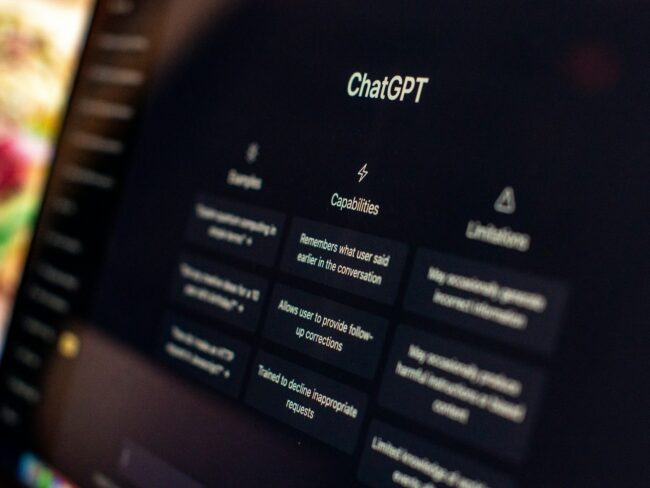There’s been plenty of talk around AI collaboration in research circles, ranging from genuine curiosity to real scepticism. However, for small research agencies especially, resisting AI carries a cost. Not only financially but creatively and competitively. AI isn’t just about big-budget innovation. It’s increasingly about survival and growth, even at smaller scales.
AI is no longer a far-fetched concept but is fully reshaping industries across the board. From finance and manufacturing to marketing and entertainment, AI-driven tools are automating routine tasks and uncovering insights at lightning speed.
Here in the UK, businesses of all sizes are starting to feel the impact. For small research agencies, whether a boutique market research firm or a two-person insights consultancy, adapting to this AI-driven world is becoming ever so increasingly important.
Embracing AI isn’t about hopping on the latest tech bandwagon; it’s about staying competitive and relevant in a landscape where competitors (large and small) are using algorithms to work faster and smarter.
Resisting AI could carry a hefty cost in missed opportunities and lost efficiency. Even the smallest UK research agencies need to see AI as an ally, not an adversary, in their quest to deliver value and remain competitive.
Understanding the Resistance to AI
Despite the buzz, many small agencies are hesitant about adopting AI. It’s worth exploring why. Common concerns and perceived barriers include:
- Cost: A belief that AI implementation is expensive and budget-busting for a small firm.
- Complexity: Fears that AI is too technical or complex for a non-tech agency to integrate.
- Skills Gap: Worries that the current team doesn’t have the expertise to use or manage AI tools.
- Job Security Fears: Some staff (or managers) fear AI could replace human roles, reducing the need for researchers.
- “Only for Big Players” Mindset: The idea that AI is something that only large enterprises can afford or benefit from, not something for a small outfit.
These concerns are understandable, but holding onto them indefinitely can be risky. In fact, evidence shows a significant portion of UK businesses are still on the fence about AI. A recent British Chambers of Commerce survey found 43% of firms have no plans to use AI technology at all. That’s a large chunk of businesses essentially sitting out the AI trend. The same survey showed only about a quarter of businesses were currently using some form of AI at the time (July 2024), indicating that many others remain cautious or unsure.
So what’s fueling this resistance?
Cost and complexity often top the list, small agencies worry that AI systems will be prohibitively expensive or difficult to implement. There’s also a lingering misconception that AI is the realm of tech giants and global corporations, not small local agencies. However, this myth that “AI is only for big companies” is steadily being debunked. AI in business has become more easily accessible and affordable than ever. Entry-level AI software or pilot projects can start at a few thousand pounds, not millions. In fact, basic AI solutions today can cost around £5,000 – a far cry from the massive investments people often imagine. This means that even a modestly sized research agency can dip its toes into AI without breaking the bank.
Another reason for reluctance is the fear of the unknown: implementing any new technology comes with a learning curve, something that we have covered in a previous post. For a small team already stretched thin, the idea of learning AI tools or altering workflows can be intimidating.
And yes, there’s the human element. People worry that bringing in AI will somehow make their skills redundant. It’s important to acknowledge these fears but also to challenge them. As we’ll discuss, AI isn’t about replacing the human element of research; it’s about enhancing it.
However, the cost of resisting AI is that agencies may miss out on tools that could make their work easier, more insightful, and more competitive. Before diving into the benefits, let’s address one of the biggest worries head-on: the idea that AI will replace human researchers.
AI as a Collaborative Tool, Not a Replacement
One of the biggest, and most cited, misconceptions about AI is that it’s gunning for jobs. In reality, AI works best with people, not instead of them. For small research agencies, thinking of AI as your collaborative research assistant rather than a replacement for human talent is key. The goal is to let AI handle the tedious tasks or analyse large datasets faster, so that human researchers can focus on higher-level thinking, creative analysis, and client interaction, the things humans are the best at.
A growing number of success stories underscore this collaborative approach. Take Grind Coffee, for example. Yes, it is a coffee company, but it is one that also does plenty of market research and customer engagement in its business.
Grind, a London-based small business, recently partnered with Google on an AI pilot program to see how AI could help its team be more productive. Employees at Grind will be using an AI assistant to help draft customer emails, generate first drafts of product descriptions, and even streamline parts of new employee onboarding. These were tasks that used to eat up staff time; with AI, the team will be able to handle them faster, freeing people to concentrate on more strategic or creative work. Importantly, Grind’s leadership emphasised that the initiative was “about more than technology; it’s an investment in people”, equipping their staff with new skills to future-proof their roles in the company. In other words, AI became a helpful colleague to their employees, not a threat.
This example illustrates a broader point: AI can be a powerful tool on your team.
A New Member Of Your Team
Imagine having a junior researcher who works 24/7, never gets tired, and can sift through thousands of data points in seconds. That’s essentially what a well-integrated AI tool can feel like. In fact, analysis by Public First for Google suggests that AI tools could boost the average UK small business’s productivity by about 20%, effectively acting like a “digital employee” added to every five-person team. That’s a significant productivity jump, and it doesn’t mean firing one of the five humans, it means each human on the team gets to be more effective with a digital helper by their side.
AI Collaboration Is About “Amplifying” Output
It’s also worth noting that many who have adopted AI aren’t seeing it slash jobs, they’re seeing it amplify output. In the UK, only a tiny fraction (2%) of businesses in one survey thought AI would actually decrease their overall productivity, whereas the vast majority saw potential for productivity to increase or stay the same
The takeaway here is a mindset shift: AI is a tool for your people, not a replacement of your people. Small agencies thrive on the expertise, creativity, and personal touch of their teams – those qualities remain irreplaceable. AI just helps those qualities shine by handling some of the grind (no coffee pun intended!). In the next section, we’ll look at how adopting this collaborative AI approach can translate into a real competitive advantage, especially in the UK context.
Why Small Agencies Shouldn’t Wait on AI
By 2025, almost half of UK SMEs had adopted some form of AI, up from just a quarter in 2022. This is no longer a tool reserved for big businesses. Smaller research agencies are already using AI to streamline admin, analyse large datasets, and deliver insights more efficiently.
It is not about replacing teams or adopting flashy tech. It is about working more effectively. AI can take care of repetitive tasks, flag useful patterns, and cut down turnaround times. That leaves more room for strategic thinking and sharper outputs.
There is also real support available. The UK government has committed funding to help SMEs explore and adopt AI, including a £7 million initiative supporting 120 small-business-led projects. These schemes are designed to reduce the risk of trying new approaches and to give smaller firms access to tools that might have been out of reach.
Client expectations are shifting too. Many now assume agencies will use modern methods as standard. Using AI-powered tools for sentiment analysis, social media tracking or survey coding is increasingly viewed as basic due diligence rather than added value.
This is not a call to overhaul everything at once. But staying out of the AI conversation could quickly become a competitive risk. As more agencies integrate these tools, those relying solely on manual processes may start to fall behind. Now is a good time to experiment, build confidence, and future-proof the way your agency works.
Practical Steps for AI Adoption
If the case for AI adoption is clear, the next step is understanding how to begin. For small research agencies, the process does not need to be overwhelming or expensive. A gradual, low-risk approach is both realistic and effective.
- Start with a small pilot. Identify one task where AI could genuinely save time or improve results. This might be using a transcription tool to turn interview recordings into text, or applying machine learning to categorise survey responses. Trial the tool on a single project, and assess its usefulness. A focused test allows your team to learn by doing and helps demonstrate the potential value without committing major time or money.
- Use available support. The UK government and industry bodies offer various forms of help. Innovate UK, the British Chambers of Commerce and others frequently run events, consultations and workshops aimed at helping SMEs take practical steps towards digital tools. Many AI providers also offer free trials, which are ideal for testing software before committing, and finally finding a tool that is custom-made for your specific needs can ensure easy adaption. For example, Aida by Beings is designed specifically for research agencies.
- Build internal knowledge. Not every team needs a data scientist. Encouraging staff to explore AI tools and share their learning can go a long way. Free online tutorials and communities are easy to access. You might nominate one person to lead on AI tools and feed back to the team. The goal here is to build confidence and familiarity over time.
- Bring in help where needed. If time or knowledge is limited, consider short-term support. A freelance consultant, university partnership or local tech firm could help set up your first AI-enabled project. Many UK universities have dedicated schemes to support SMEs with digital innovation.
Focus on supporting, not replacing, your team. AI works best when used to remove repetitive or labour-intensive tasks. Involve your team in identifying where AI could help, whether that is cleaning data, flagging insights or producing first drafts. This collaborative approach helps reduce hesitation and increases buy-in.
Each of these steps should feel manageable while also building towards long-term capability in both AI, but also general operations.
AI as a Strategic Partner
Adopting AI does not mean changing everything overnight. For small research agencies, the real value lies in improving the quality and efficiency of your existing work by using AI.
Rather than aiming for full automation, think about where AI can extend your team’s capabilities. It can take care of repetitive tasks, surface patterns in data, or generate starting points for reports. This frees your researchers to focus on analysis, interpretation and client relationships.
These benefits are not theoretical. They are already being realised across the UK, with almost half of SMEs now using some form of AI. Government support continues to grow, with funding and training programmes aimed at helping smaller businesses adopt digital tools. Economic forecasts also point to significant long-term value. According to a report by Accenture, generative AI could almost double the UK’s annual economic growth rate, adding up to £736 billion to GDP by 2038. Much of that growth is expected to come from productivity gains across sectors, including professional services and research.
Clients are increasingly aware of these developments. Many now expect agencies to use modern tools as standard. Using AI for things like social listening, trend analysis or text processing is quickly becoming part of the baseline, not a bonus.
The key is to start. Begin with one tool or project. Learn from the experience, build confidence, and expand gradually. AI should be seen as a practical support system, not a disruptive force. Agencies that begin experimenting now are more likely to stay relevant, grow capacity and continue delivering high-quality work.
If you want to learn more about how AI can help bolster your efforts, but also reassure you about concerns, get in touch with Beings.com today to learn more.



